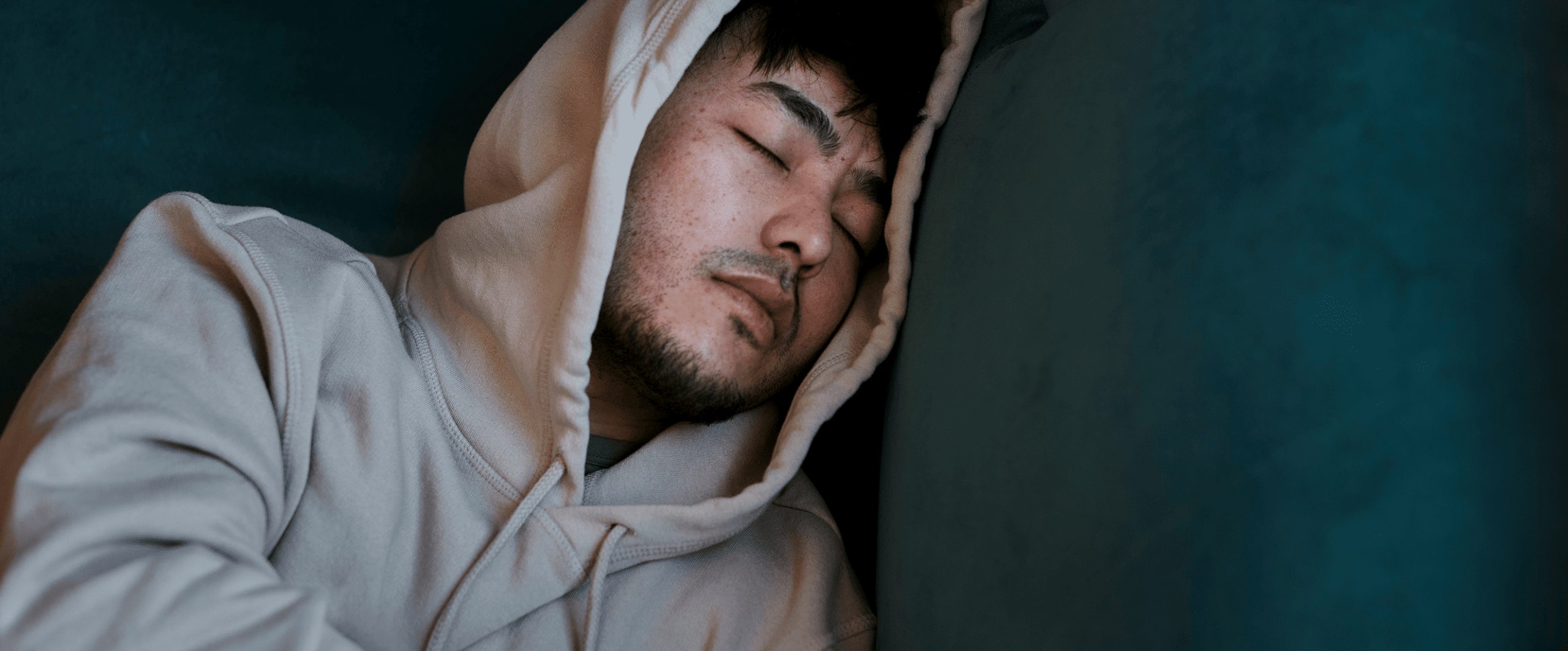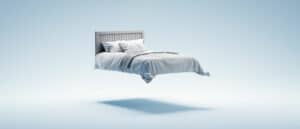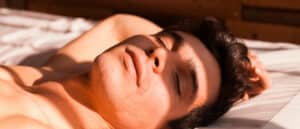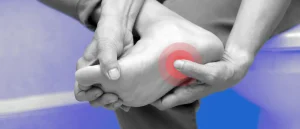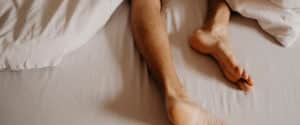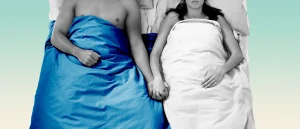If Sleeping Makes You Tired, Read This
- By Kayla Blanton
- Fact-checked by Joy Ferguson
- June 6, 2022
Fast Facts
- Excessive sleep is the body’s attempt to get the recovery it’s lacking.
- If you’re sleeping 12 hours per night every night and still feel tired, you could be struggling to get quality restorative sleep.
- Environmental factors as well as certain underlying health issues could be the cause of excessive sleepiness, such as sleep apnea, low testosterone, and sleep disorders.
There’s a difference between the familiar fatigue that strikes on Monday mornings, and a more unrelenting drag that leaves you dozing during every lunch break. If you’re battling the latter (and coffee doesn’t scratch the surface), consider it a red flag, because despite what hustle mentality says, it’s not normal to feel exhausted all of the time.
What Does It Mean to Sleep Too Much (Excessive Sleepiness)?
Excessive sleep is the body’s attempt to get the recovery it’s lacking. If you’re suddenly sleeping more than usual or feeling like you could always go for a nap, chances are you’re not getting deep, restorative sleep, explains Nick Dahl, D.O.
If your situation is severe, there is also a medical condition called hypersomnia. (1) According to the National Institute of Neurological Disorders and Stroke, “Hypersomnia is characterized by recurrent episodes of excessive daytime sleepiness or prolonged nighttime sleep. Different from feeling tired due to lack of or interrupted sleep at night, persons with hypersomnia are compelled to nap repeatedly during the day, often at inappropriate times such as at work, during a meal, or in conversation. These daytime naps usually provide no relief from symptoms. Patients often have difficulty waking from a long sleep, and may feel disoriented.”
Research shows that crucial processes like muscle repair, protein synthesis, and tissue growth occur primarily during sleep. (2). Studies suggest that sleep plays an important role in helping to keep your cognitive abilities sharp, including memory (3). So, when you’re not getting it, your body does everything it can to find it. Enter: excessive sleeping.
How to Know If You’re Sleeping Too Much
A sudden involuntary increase in sleep that you can’t shake is a problem, says Dr. Dahl.
He adds, “If a person sleeps eight hours nightly and still feels constant fatigue and the desire to nap, that could also indicate a problem.” For example, if you often wake up at 7:00 a.m. after getting a full eight hours and doze off again by 9:00., although you may be sleeping at night, you may not actually be getting rest. Constant fatigue is also a tell-tale sign that something’s up.
Is It Normal to Sleep 12 Hours a Day?
If you just stayed up for 72 hours to meet a big deadline, then sure, 12 hours of sleep in one day is warranted, explains Abhinav Singh, M.D., M.P.H., F.A.A.S.M., medical director of the Indiana Sleep Center, medical review panelist for Sleep Foundation and co-author of Sleep to Heal. But if you’re snoozing for that long on a daily basis, there’s likely an underlying issue. “Sleeping past ten hours is called long sleep, [it means] something’s not right,” he adds. “If you’re sleeping 12 hours every day in your normal state of health, there’s a problem.”
- It’s not normal to feel exhausted all of the time
- Excessive sleep is the body’s attempt to get the recovery it’s lacking
- There is also a medical condition called hypersomnia
What Is the Ideal Amount of Sleep for Adults
Seven to nine hours of nightly sleep is recommended for most adults, Dr. Singh says. However, individual preferences and energy levels vary greatly, which is why he encourages patients to do a little experiment: “Figure out what your body’s natural sleep number is,” he says. By that, he means taking at least a week, if you can, to turn off alarms and wake up naturally. The average number of hours you sleep per night in that environment is ideal. “Try to aim for getting there on a regular basis,” he says.
Possible Medical Reasons for Sleeping Too Much
Minor interruptions from bed partners, pets, and tech screens are common enemies of sleep. However, if those are eliminated from the equation and getting shut-eye is still a struggle, one of the following health issues may be at hand.
Sleep apnea
Sleep apnea is characterized by a change in breathing patterns during sleep. “You stop taking in oxygen, which raises your carbon dioxide (CO2) level, and your brain wakes your body up to take a breath,” explains Dr. Dahl. In severe cases, such episodes, called apneas, can happen up to 30 times per hour (4), which wreaks havoc on sleep quality. “You may be in bed and think you’re asleep for ten hours, but you’re not getting restored,” Dr. Dahl adds.
Low testosterone
Chronic fatigue is a key symptom of low testosterone, explains Dr. Dahl. The hormone deficiency affects men’s ability to fall and stay asleep. “That’s more of a metabolic thing,” he says. “You just need to get the testosterone fixed.”
Restless leg syndrome
Five to ten percent of adults are affected by restless leg syndrome, according to the National Sleep Foundation. It causes extreme discomfort in the legs in the form of itching, prickling, or crawling sensations, creating the urge to move them. These feelings can disrupt sleep and result in feeling tired throughout the day.
Sleep disorders
An array of sleep disorders including sleepwalking and narcolepsy (a neurological disorder that affects the brain’s ability to control sleep-wake cycles) disturb sleep quality and therefore lead to daytime fatigue and sleeping more than usual (5, 6).
- Seven to nine hours of nightly sleep is recommended for most adults
- Minor interruptions from bed partners, pets, and tech screens are common enemies of sleep
- Chronic fatigue is a key symptom of low testosterone
How to Treat Excessive Sleepiness
Remedying constant exhaustion is all about improving the sleep you do get, and these simple bedtime practices can make a world of difference, according to Dr. Singh and Dr. Dahl. You just have to take them seriously.
- Cut caffeine after 3 p.m.
- Don’t go to bed hungry. “Eat a high-protein meal around 5:00 p.m. or 6:00 p.m.,” says Dr. Dahl.
- Limit alcohol. Research says the body’s processing of it disrupts sleep (7).
- Turn off the TV (and other screens) at least an hour before bed.
- Stick to a bedtime, even on weekends. Dr. Dahl says it trains you to wind down at the same time every night.
- Keep pets out of the bedroom. Yes, they’re cute, but a paw to the face is a definite sleep disruption, says Dr. Singh.
- Empty your bladder before laying down. Dr. Singh also suggests not drinking liquids up to an hour before falling asleep to avoid mid-night bathroom runs.
- Set the mood. Dr. Singh recommends doing whatever it takes to create a calm, relaxing sleep environment, whether that means turning on a fan, using a sleep spray, or reading a book before turning out the lights. “Make sure your body and mind are at peace,” he says.
The Bottom Line
References:
1. Plante, David T. “Nocturnal sleep architecture in idiopathic hypersomnia: a systematic review and meta-analysis.” Sleep medicine vol. 45 (2018): 17-24. doi:10.1016/j.sleep.2017.10.005
2. Brinkman JE, Reddy V, Sharma S. Physiology of Sleep. [Updated 2021 Sep 24]. In: StatPearls [Internet]. Treasure Island (FL): StatPearls Publishing; 2022 Jan-. Available from: https://www.ncbi.nlm.nih.gov/books/NBK482512/
3. Harvard Medical School. “Sleep, Learning, and Memory | Healthy Sleep.” Healthy Sleep, The Division of Sleep Medicine at Harvard Medical School, 18 Dec. 2007, healthysleep.med.harvard.edu/healthy/matters/benefits-of-sleep/learning-memory.
4. “The Dangers of Uncontrolled Sleep Apnea.” Johns Hopkins Medicine, 10 Mar. 2022, www.hopkinsmedicine.org/health/wellness-and-prevention/the-dangers-of-uncontrolled-sleep-apnea.
5. “Sleepwalking – Symptoms and Causes.” Mayo Clinic, 21 July 2017, www.mayoclinic.org/diseases-conditions/sleepwalking/symptoms-causes/syc-20353506.
6. “Narcolepsy Fact Sheet | National Institute of Neurological Disorders and Stroke.” National Institute of Neurological Disorders and Stroke, www.ninds.nih.gov/Disorders/Patient-Caregiver-Education/Fact-Sheets/Narcolepsy-Fact-Sheet.
7. Roehrs, Timothy, and Thomas Roth. “Sleep, Sleepiness, Sleep Disorders and Alcohol Use and Abuse.” Sleep Medicine Reviews, vol. 5, no. 4, 2001, pp. 287–97. Crossref, https://doi.org/10.1053/smrv.2001.0162.



